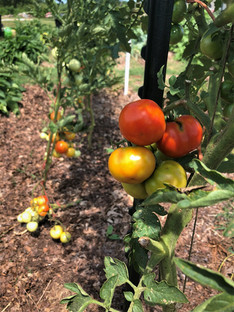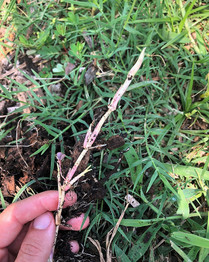July, 2022
- Rosa
- Aug 2, 2022
- 4 min read

It's summer on the farm, which means hot sun, bountiful harvests, and hoping for thunderstorms. The animals forage in the morning and rest in midday shade. The bees and wasps march diligently from zinnia to zinnia. And the veggies ripen as fast as they can be picked.
I've found a particular favorite of mine to be the eucalyptus. After huddling all winter in the shelter of row covers, it's finally stretching its elegant, silver-green limbs. It's taller than me now, which admittedly isn't that tall. It seems to relish the heat that has scared the collards and peas into next fall.
Despite the one-million-degree temperatures, planning is underway for cooler weather. There are some difficult choices to make, including the fate of the flower garden's soil.
We laid down the first soil in 2019, and those beds served as our flower garden for nearly four growing seasons. In all that time we have never tilled. A primary benefit of this minimal soil disturbance is increasing aggregation. In aggregation, soil particles clump together, and the spaces between them allow air to circulate to roots and rain to soak into the earth. The builders of soil structure are microorganisms, fungi, bugs, plants, and time.
Unfortunately, beneficial creatures are not the only things that call our dirt home. Weeds have a firm foothold in our flower garden, and are marching steadily forward. They present the problem of competition. Right now, we can plant zinnias into a bed and a week later harvest a healthy crop of grass.
Generally, no-till practices, even on herbicide-free farms, eventually lead to fewer weeds than tilling practices. But a series of factors have led to a loss of balance in the flower garden, and now we have to decide how to manage the deeply entrenched populations. Our three options are pull, smother, and obliterate.
There are two culprits in question. The first is sedge, a grass-like plant which spreads quickly via rhizomes. The second is Bermuda grass, also known as devil's grass, which, honestly, is being kind.
Bermuda grass spreads via sturdy stems, which can race along the surface of the soil or push through it. Seemingly undeterred by any depth or duration of darkness, the sharp white stem will tunnel along until it reaches sunlight. Unlike normal, polite weeds, pulling Bermuda grass reveals not a bunch of roots, but a bunch of stems leading deeper into the garden. The stems break only with force; ten minutes of pulling can raise blisters, even with gloves on. And the best part is, a single shard of stem can spawn an entirely new plant.
So, pulling and smothering with mulch will only go so far for these particular weeds. We're left with the final option; obliterate the entire garden. That means chickens. Once the growing season is over, the chickens will move to the garden to scratch and forage the weeds.
Of course, there's a lot to lose. First and foremost, the soil structure. The chickens will disrupt the soil aggregation and biology. But they will dig and consume the weeds, knocking down the population below what we could achieve without them. And they will add nitrogen via manure, as well. It's a difficult decision, and the factors are hard to measure quantitatively. But we decided it was worth it, and set to work.
First we had to re-plan to account for the the loss of our usual site for over-wintering flowers. Then we had to prepare and plant beds according to the new plan. Again, there were factors to weigh. For example, I needed two flower beds in a certain location, so I chose to clear amaranth a few weeks ahead of schedule, and to remove dahlias which were not on track to be productive (due to pests and weather.)
But in a holistic farm, as in an ecosystem, nothing is lost without a gain. The dahlias went to the chickens, so plants and pests become eggs and manure. (The dahlia tubers unfortunately don't store well enough at this time of year.) And the old amaranth went to the herd, who adore amaranth enormously.
The Bermuda grass and other weeds went to the garbage, where they belong. (Just kidding. Concetta chopped them up with the mower into the lawn.)
Once the beds were cleared, we sowed sunflower seeds. Throughout July we've also planted zinnias, okra, beans, and squash. Big summer seeds like this are sown directly into the garden. In the heat, water basically evaporates as soon as it touches the ground, so keeping the seeds wet is a daily labor. But there's nothing more rewarding than little green leaves poking up from the earth.
The patches of green in the first photo are old kale stems left behind in a bed sown with zinnia seeds. We never pull crop roots out of the ground. We simply cut at the bases and plant between them. A handful of crop varieties begin to regrow, but can be easily pinched back or solarized with tarp. Most do not, and their roots decay into the undisturbed soil.
Lilly spent a day mining the gold from the chicken run. Our layer hens are currently working through a gigantic leaf pile, and some parts have fully transformed into soil, which is what Lilly was after.
Most of the chicken run will become a new garden, but we required a bit of soil to top-dress some beds. However, fresh chicken manure can damage plants because of the high nitrogen content. Lilly had the unenviable job of hauling wheelbarrows of chicken soil to a compost pile, where it will transform into excellent, nutrient-rich soil.
Smaller workers are also hard at work building soil, though perhaps a bit slower. If you sink your hand into a leaf pile or mulch path, you can find the white mycelium of the fungi. Mushrooms emerge after a string of afternoon thunderstorms, which everyone and everything on the farm was grateful for after a long, hot July.

Lilly and I have returned to work here after nearly two years away. It's been a joy to return to land that continued to flourish under Concetta's care. We all look forward to the growth and abundance to come.
P.S.
Meet our newest farmer, Bagheera! He commutes to the Farm Girl Deliveries farm, where he enjoys dashing through the crops, lazing in the shade, and sleeping during the hottest 5 hours of the day.


























































Comments